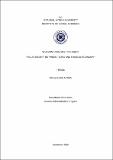DSpace Repository
SHADOW ECONOMY IN TURKEY “RELATIONSHIP BETWEEN TAXES AND SHADOW ECONOMY
JavaScript is disabled for your browser. Some features of this site may not work without it.
| dc.contributor.author | ELKHARRAS, Mouna
|
|
| dc.date.accessioned | 2021-04-16T06:22:10Z | |
| dc.date.available | 2021-04-16T06:22:10Z | |
| dc.date.issued | 2019 | |
| dc.identifier.uri | http://hdl.handle.net/11547/7223 | |
| dc.description.abstract | This work focuses on the understanding of what has been wrongly called the “informal economy”. The aim of this thesis is to show that this shadow economy is, in fact, a set of strategies implemented by socio-economic actors in need of filling a gap. This lack is expressed either through the search for additional income or new income, or through the creation of income never available before. Hence, in this study we made in light the concept of shadow economy, its types and activities and factors that could have an impact on it, we choose to study the relationship between all of unemployment rate, corporation income tax, interest rate, goods and services tax, value added tax, revenue tax, labor force participation rate, labor force ratio, property tax, individual income tax, capital and financial transactions tax, and total revenue taxes on the size of the shadow economy within developing countries, especially Turkey which is the subject of the study. The theoretical work is basically from the literature review about shadow economy, from previous studies and in points of view of dominant schools of thoughts and researchers, besides the evolution of this phenomenon, causes, classification. The research is basically done in quantitative methods, data collected from OECD about Turkey and Sweden and analyzed by utilizing basic statistics and transferred to SPSS and analyzed. Descriptive statistics and correlation tests in order to test the authenticity of hypothesis. The results indicate that there is an effect of taxes and the size of the shadow economy in different way. The regression results indicate that there is a significant strong relationship between individual income tax, capital and financial transactions tax, and property tax and the GDP growth, hence, by the end there is an effect of taxes on the shadow economy | tr_TR |
| dc.subject | Shadow economy | tr_TR |
| dc.subject | total revenue taxes | tr_TR |
| dc.subject | interest rate | tr_TR |
| dc.subject | OECD | tr_TR |
| dc.subject | Turkey | tr_TR |
| dc.title | SHADOW ECONOMY IN TURKEY “RELATIONSHIP BETWEEN TAXES AND SHADOW ECONOMY | tr_TR |
| dc.type | Thesis | tr_TR |
Files in this item
This item appears in the following Collection(s)
-
Tezler -- Thesis [3536]
